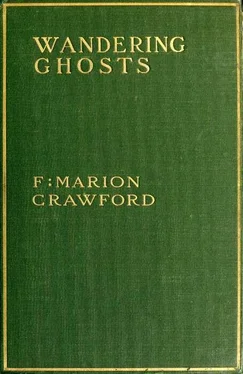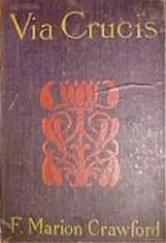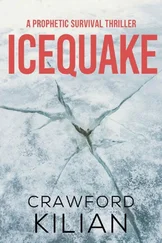F. Crawford - Wandering Ghosts
Здесь есть возможность читать онлайн «F. Crawford - Wandering Ghosts» весь текст электронной книги совершенно бесплатно (целиком полную версию без сокращений). В некоторых случаях можно слушать аудио, скачать через торрент в формате fb2 и присутствует краткое содержание. Год выпуска: 2012, Жанр: Ужасы и Мистика, на английском языке. Описание произведения, (предисловие) а так же отзывы посетителей доступны на портале библиотеки ЛибКат.
- Название:Wandering Ghosts
- Автор:
- Жанр:
- Год:2012
- ISBN:нет данных
- Рейтинг книги:3 / 5. Голосов: 1
-
Избранное:Добавить в избранное
- Отзывы:
-
Ваша оценка:
- 60
- 1
- 2
- 3
- 4
- 5
Wandering Ghosts: краткое содержание, описание и аннотация
Предлагаем к чтению аннотацию, описание, краткое содержание или предисловие (зависит от того, что написал сам автор книги «Wandering Ghosts»). Если вы не нашли необходимую информацию о книге — напишите в комментариях, мы постараемся отыскать её.
Wandering Ghosts — читать онлайн бесплатно полную книгу (весь текст) целиком
Ниже представлен текст книги, разбитый по страницам. Система сохранения места последней прочитанной страницы, позволяет с удобством читать онлайн бесплатно книгу «Wandering Ghosts», без необходимости каждый раз заново искать на чём Вы остановились. Поставьте закладку, и сможете в любой момент перейти на страницу, на которой закончили чтение.
Интервал:
Закладка:
Nobody can understand that there can be much consolation in a funeral, unless he has felt that blank feeling there is when a man's gone overboard whom everybody likes. I suppose landsmen think it would be easier if they didn't have to bury their fathers and mothers and friends; but it wouldn't be. Somehow the funeral keeps up the idea of something beyond. You may believe in that something just the same; but a man who has gone in the dark, between two seas, without a cry, seems much more beyond reach than if he were still lying on his bed, and had only just stopped breathing. Perhaps Jim Benton knew that, and wanted to come back to us. I don't know, and I am only telling you what happened, and you may think what you like.
Jack stuck by the wheel that night until the watch was over. I don't know whether he slept afterwards, but when I came on deck four hours later, there he was again, in his oilskins, with his sou'wester over his eyes, staring into the binnacle. We saw that he would rather stand there, and we left him alone. Perhaps it was some consolation to him to get that ray of light when everything was so dark. It began to rain, too, as it can when a southerly gale is going to break up, and we got every bucket and tub on board, and set them under the booms to catch the fresh water for washing our clothes. The rain made it very thick, and I went and stood under the lee of the staysail, looking out. I could tell that day was breaking, because the foam was whiter in the dark where the seas crested, and little by little the black rain grew grey and steamy, and I couldn't see the red glare of the port light on the water when she went off and rolled to leeward. The gale had moderated considerably, and in another hour we should be under way again. I was still standing there when Jack Benton came forward. He stood still a few minutes near me. The rain came down in a solid sheet, and I could see his wet beard and a corner of his cheek, too, grey in the dawn. Then he stooped down and began feeling under the anchor for his pipe. We had hardly shipped any water forward, and I suppose he had some way of tucking the pipe in, so that the rain hadn't floated it off. Presently he got on his legs again, and I saw that he had two pipes in his hand. One of them had belonged to his brother, and after looking at them a moment I suppose he recognized his own, for he put it in his mouth, dripping with water. Then he looked at the other fully a minute without moving. When he had made up his mind, I suppose, he quietly chucked it over the lee rail, without even looking round to see whether I was watching him. I thought it was a pity, for it was a good wooden pipe, with a nickel ferrule, and somebody would have been glad to have it. But I didn't like to make any remark, for he had a right to do what he pleased with what had belonged to his dead brother. He blew the water out of his own pipe, and dried it against his jacket, putting his hand inside his oilskin; he filled it, standing under the lee of the foremast, got a light after wasting two or three matches, and turned the pipe upside down in his teeth, to keep the rain out of the bowl. I don't know why I noticed everything he did, and remember it now; but somehow I felt sorry for him, and I kept wondering whether there was anything I could say that would make him feel better. But I didn't think of anything, and as it was broad daylight I went aft again, for I guessed that the Old Man would turn out before long and order the spanker set and the helm up. But he didn't turn out before seven bells, just as the clouds broke and showed blue sky to leeward—"the Frenchman's barometer," you used to call it.
Some people don't seem to be so dead, when they are dead, as others are. Jim Benton was like that. He had been on my watch, and I couldn't get used to the idea that he wasn't about decks with me. I was always expecting to see him, and his brother was so exactly like him that I often felt as if I did see him and forgot he was dead, and made the mistake of calling Jack by his name; though I tried not to, because I knew it must hurt. If ever Jack had been the cheerful one of the two, as I had always supposed he had been, he had changed very much, for he grew to be more silent than Jim had ever been.
One fine afternoon I was sitting on the main-hatch, overhauling the clockwork of the taffrail-log, which hadn't been registering very well of late, and I had got the cook to bring me a coffee-cup to hold the small screws as I took them out, and a saucer for the sperm oil I was going to use. I noticed that he didn't go away, but hung round without exactly watching what I was doing, as if he wanted to say something to me. I thought if it were worth much, he would say it anyhow, so I didn't ask him questions; and sure enough he began of his own accord before long. There was nobody on deck but the man at the wheel, and the other man away forward.
"Mr. Torkeldsen," the cook began, and then stopped.
I supposed he was going to ask me to let the watch break out a barrel of flour, or some salt horse.
"Well, doctor?" I asked, as he didn't go on.
"Well, Mr. Torkeldsen," he answered, "I somehow want to ask you whether you think I am giving satisfaction on this ship, or not?"
"So far as I know, you are, doctor. I haven't heard any complaints from the forecastle, and the captain has said nothing, and I think you know your business, and the cabin-boy is bursting out of his clothes. That looks as if you are giving satisfaction. What makes you think you are not?"
I am not good at giving you that West Indies talk, and shan't try; but the doctor beat about the bush awhile, and then he told me he thought the men were beginning to play tricks on him, and he didn't like it, and thought he hadn't deserved it, and would like his discharge at our next port. I told him he was a d——d fool, of course, to begin with; and that men were more apt to try a joke with a chap they liked than with anybody they wanted to get rid of; unless it was a bad joke, like flooding his bunk, or filling his boots with tar. But it wasn't that kind of practical joke. The doctor said that the men were trying to frighten him, and he didn't like it, and that they put things in his way that frightened him. So I told him he was a d——d fool to be frightened, anyway, and I wanted to know what things they put in his way. He gave me a queer answer. He said they were spoons and forks, and odd plates, and a cup now and then, and such things.
I set down the taffrail-log on the bit of canvas I had put under it, and looked at the doctor. He was uneasy, and his eyes had a sort of hunted look, and his yellow face looked grey. He wasn't trying to make trouble. He was in trouble. So I asked him questions.
He said he could count as well as anybody, and do sums without using his fingers, but that when he couldn't count any other way, he did use his fingers, and it always came out the same. He said that when he and the cabin-boy cleared up after the men's meals there were more things to wash than he had given out. There'd be a fork more, or there'd be a spoon more, and sometimes there'd be a spoon and a fork, and there was always a plate more. It wasn't that he complained of that. Before poor Jim Benton was lost they had a man more to feed, and his gear to wash up after meals, and that was in the contract, the doctor said. It would have been if there were twenty in the ship's company; but he didn't think it was right for the men to play tricks like that. He kept his things in good order, and he counted them, and he was responsible for them, and it wasn't right that the men should take more things than they needed when his back was turned, and just soil them and mix them up with their own, so as to make him think—
He stopped there, and looked at me, and I looked at him. I didn't know what he thought, but I began to guess. I wasn't going to humour any such nonsense as that, so I told him to speak to the men himself, and not come bothering me about such things.
Читать дальшеИнтервал:
Закладка:
Похожие книги на «Wandering Ghosts»
Представляем Вашему вниманию похожие книги на «Wandering Ghosts» списком для выбора. Мы отобрали схожую по названию и смыслу литературу в надежде предоставить читателям больше вариантов отыскать новые, интересные, ещё непрочитанные произведения.
Обсуждение, отзывы о книге «Wandering Ghosts» и просто собственные мнения читателей. Оставьте ваши комментарии, напишите, что Вы думаете о произведении, его смысле или главных героях. Укажите что конкретно понравилось, а что нет, и почему Вы так считаете.












